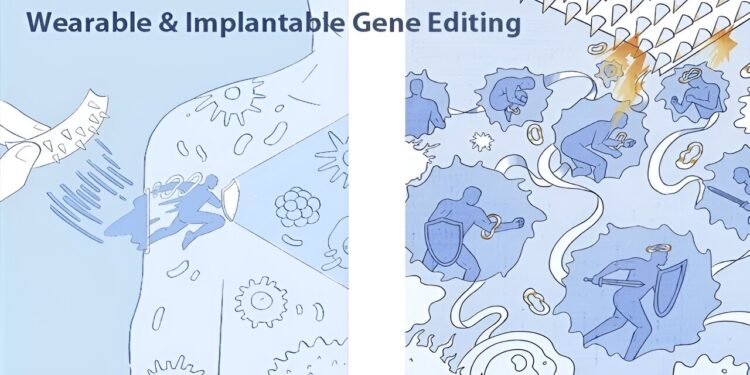Soft hydrogel electrodes encapsulating cancer antigen nucleic acids are developed for in vivo gene delivery and cell electroporation in a single procedure on the skin, facilitating activation of tumor-fighting T cells by genetically modified dendritic cells, enhancing cancer-specific immune responses for therapeutic benefits. Credit: Proceedings of the National Academy of Sciences (2024). DOI: 10.1073/pnas.2322264121
Nucleic acid (NA)-based medicine has been at the center of research over the past two decades and has shown great promise for both therapeutics and vaccines. The rapid development and deployment of NA-based vaccines during the COVID-19 pandemic has highlighted their potential.
However, the efficient in vivo delivery of these nucleic acids, especially when cytosolic delivery is required without leaving residual materials in the body, remains unresolved.
A study led by Professor Shi Peng from the Department of Biomedical Engineering at the City University of Hong Kong (CityUHK) addressed this challenge by developing a multifunctional organic hydrogel-based electronic device.
This innovative device is capable of transdermal delivery of nucleic acids and in vivo cell electroporation on microarray, providing a promising solution for one-step, self-administered, and painless transdermal gene delivery in clinical immunotherapy.
“This technology could transform the use of nucleic acid-based therapies in the human body to deploy the immune system as a tool to treat different diseases, including cancer,” Professor Shi said.
The results were published in the Proceedings of the National Academy of Sciencesentitled “Transdermal microarray electroporation for enhanced cancer immunotherapy based on DNA vaccination”.
The uniqueness of this technology lies in its footprint-free approach, which offers a simple and efficient method to introduce DNA/RNA into the human body without leaving additional reagents. This method allows genetic manipulation of subcutaneous immune cells for therapeutic purposes without requiring systemic administration of a large number of nucleic acids.
Schematic of transdermal microarray electroporation for enhanced cancer immunotherapy based on DNA vaccination. Credit: Proceedings of the National Academy of Sciences (2024). DOI: 10.1073/pnas.2322264121
“The most challenging part of this research was to develop a hydrogel-based electronic device that integrates multiple functions into a unified construct,” Professor Shi said.
“This device performs skin penetration, DNA encapsulation and release, and cellular electroporation in consecutive programmed operations on the skin.”
This research promises to revolutionize the delivery of nucleic acid vaccines by offering a painless solution via a wearable electronic patch on the skin. The innovation involves using a conductive hydrogel to fabricate microscopic electrodes preloaded with DNA encoding cancer-specific antigenic proteins.
When pressed against the skin, the electrodes penetrate the surface layer, rehydrate, and are electrically triggered to release the DNA into the subcutaneous space.
The device then applies programmed electrical pulses to achieve highly efficient DNA transfection in dendritic cells, thereby activating cancer-specific adaptive immunity. This method has been shown to effectively inhibit tumor growth in both therapeutic and prophylactic modes in rodent models.
Fluorescent images showing OVA expression in subcutaneous dendritic cells (CD11c+) 48 hours after µEPO-mediated transdermal administration of OVA-DNA. Credit: Proceedings of the National Academy of Sciences (2024). DOI: 10.1073/pnas.2322264121
Beyond cancer immunotherapy, the technology could be adapted to a variety of DNA and RNA-based treatments, including vaccines for infectious diseases and gene therapies for genetic disorders.
Future plans for the research team include refining the device for human use and studying its effectiveness in treating different types of cancers and other diseases. This pioneering research opens new avenues for the application of nucleic acid-based medicine, potentially transforming the landscape of therapeutic and preventive healthcare.
More information:
Yuan Wang et al, Transdermal microarray electroporation for enhanced cancer immunotherapy based on DNA vaccination, Proceedings of the National Academy of Sciences (2024). DOI: 10.1073/pnas.2322264121
Provided by City University of Hong Kong
Quote:A hydrogel-based device enables painless transdermal delivery of nucleic acids for cancer immunotherapy (2024, August 15) retrieved August 15, 2024 from
This document is subject to copyright. Apart from any fair dealing for the purpose of private study or research, no part may be reproduced without written permission. The content is provided for informational purposes only.



